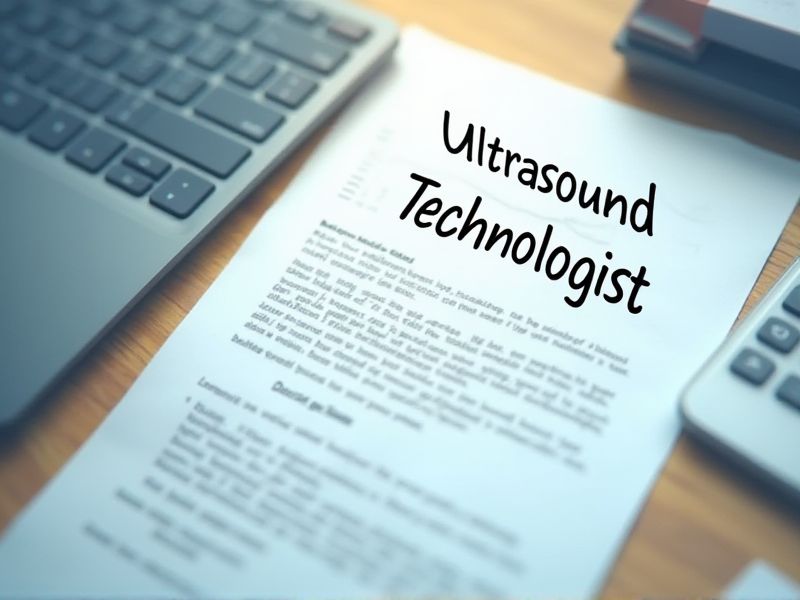
The healthcare industry demands precision and reliability, factors significantly impacted by the qualifications of its professionals. For ultrasound technologists, certain certifications ensure a deep understanding of medical imaging techniques and patient care standards, directly affecting patient diagnosis and treatment outcomes. Certifications also verify the technologist's ability to proficiently operate complex ultrasound equipment and adhere to industry regulations. Here are critical certifications needed for an ultrasound technologist.
Registered Diagnostic Medical Sonographer (RDMS)
Employing a Registered Diagnostic Medical Sonographer ensures that ultrasound technologists have met rigorous standards of competency and knowledge. This certification validates expertise in operating ultrasound equipment and interpreting sonographic data accurately. Patients benefit from improved diagnostic accuracy, leading to more effective treatment plans. The healthcare facility gains credibility and reduces liability by ensuring professionals hold this recognized credential.
Registered Diagnostic Cardiac Sonographer (RDCS)
The Registered Diagnostic Cardiac Sonographer (RDCS) credential ensures a technologist possesses specialized knowledge and skills for accurately assessing cardiac structures through ultrasound. It elevates the standard of patient care by validating the technologist's proficiency in utilizing and interpreting cardiology-related imaging. Employers and medical institutions seek RDCS-certified individuals to reduce diagnostic errors and improve patient outcomes. The credential also signifies a commitment to ongoing education, reflecting the evolving nature of medical technology and sonography.
Registered Vascular Technologist (RVT)
Registered Vascular Technologists (RVTs) are crucial in ultrasound because they possess specialized knowledge and certification in vascular imaging. Their expertise ensures precise diagnosis of vascular conditions, leading to more accurate treatment plans. By holding an RVT certification, technologists demonstrate their commitment to industry standards and ongoing education. Healthcare facilities often require RVT credentials to meet accreditation standards, enhancing the quality of patient care.
Registered Cardiac Sonographer (RCS)
A Registered Cardiac Sonographer (RCS) possesses specialized skills in cardiac ultrasound procedures, which enhances diagnostic accuracy. Their expertise in echocardiography helps in early detection and management of heart abnormalities. Due to advancements in cardiac imaging technology, hospitals require RCS professionals to operate sophisticated equipment efficiently. Clinical outcomes improve with RCS involvement as they bring precise interpretation and patient-centered care.
Registered Vascular Specialist (RVS)
Registered Vascular Specialists (RVS) enhance the diagnostic accuracy of ultrasound technologists by utilizing their specialized knowledge of vascular conditions. Their expertise in interpreting complex vascular images reduces the potential for diagnostic errors, improving patient outcomes. The presence of an RVS within ultrasound teams ensures adherence to the latest standards and protocols in vascular imaging. Employers often seek RVS-certified professionals to bolster their facility's credibility and service quality in diagnostic imaging.
ARRT Ultrasound Certification
ARRT Ultrasound Certification improves employment prospects for ultrasound technologists by validating their competency and adherence to industry standards. Certification ensures consistent quality of care, as certified technologists are up-to-date with the latest techniques and technologies. Many healthcare facilities prefer or require certification, impacting job placement and career advancement. It also provides personal satisfaction and professional recognition, enhancing the technologist's credibility in the medical community.
Point-of-Care Ultrasound (POCUS) Certification
Point-of-Care Ultrasound (POCUS) Certification ensures ultrasound technologists possess the necessary skillset for immediate and accurate imaging, improving patient care. Standardized certification leads to consistent quality across practice settings, minimizing diagnostic errors. Certified technologists gain professional recognition, enhancing career opportunities and trust from colleagues and patients. Rigorous certification processes facilitate continual education and adaptation to advancing ultrasound technologies.
Basic Life Support (BLS) Certification
Basic Life Support (BLS) Certification equips ultrasound technologists with the essential skills to respond effectively to cardiac emergencies that may occur during diagnostic procedures. Understanding and practicing BLS ensures these technologists can provide immediate CPR and use an automated external defibrillator (AED) if required, improving patient survival rates. Medical environments often require BLS certification to maintain a standard of care across all team members. BLS knowledge enhances the technologist's confidence and capability in high-stress situations, ensuring patient safety is prioritized.
Advanced Cardiac Life Support (ACLS) Certification
Advanced Cardiac Life Support (ACLS) Certification equips ultrasound technologists with critical skills to respond effectively to cardiac emergencies, enhancing patient safety during procedures. The certification ensures that technologists can recognize and manage life-threatening arrhythmias, comprehensive skills required in high-stakes diagnostic settings. Hospitals and clinics often require or prefer ACLS-certified ultrasound technologists to meet accreditation standards and reduce liability concerns. Earning ACLS certification can also expand career opportunities for technologists, as it increases their competency in emergency situations and demonstrates a commitment to professional growth.
Fetal Echocardiography Certification
Fetal echocardiography certification for ultrasound technologists is necessary to ensure accurate assessment of fetal heart conditions, reducing potential risks for both the mother and the fetus. Certification establishes standardized competencies, increasing trust in the technologist's ability to detect congenital heart defects early. With advances in prenatal care, certified professionals are better equipped to provide specialized care and contribute valuable insights for managing pregnancies. This certification improves career prospects, as healthcare institutions prioritize hiring individuals with specialized skills in high-demand areas.
Summary
You may find that obtaining certifications as an Ultrasound Technologist enhances your employability and career prospects. Employers often prefer certified technicians, leading to increased job opportunities and potentially higher compensation. Specialized certifications demonstrate your commitment to professional development, which can lead to greater job satisfaction and career fulfillment. With advanced credentials, you may also gain access to roles involving complex imaging techniques, broadening your professional expertise.
